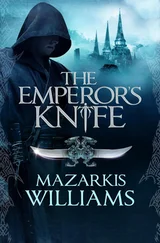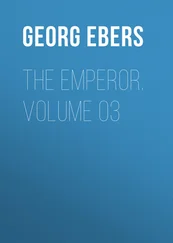Tim Severin - The Emperor's Elefant
Здесь есть возможность читать онлайн «Tim Severin - The Emperor's Elefant» весь текст электронной книги совершенно бесплатно (целиком полную версию без сокращений). В некоторых случаях можно слушать аудио, скачать через торрент в формате fb2 и присутствует краткое содержание. Жанр: Исторические приключения, на английском языке. Описание произведения, (предисловие) а так же отзывы посетителей доступны на портале библиотеки ЛибКат.
- Название:The Emperor's Elefant
- Автор:
- Жанр:
- Год:неизвестен
- ISBN:нет данных
- Рейтинг книги:5 / 5. Голосов: 1
-
Избранное:Добавить в избранное
- Отзывы:
-
Ваша оценка:
- 100
- 1
- 2
- 3
- 4
- 5
The Emperor's Elefant: краткое содержание, описание и аннотация
Предлагаем к чтению аннотацию, описание, краткое содержание или предисловие (зависит от того, что написал сам автор книги «The Emperor's Elefant»). Если вы не нашли необходимую информацию о книге — напишите в комментариях, мы постараемся отыскать её.
The Emperor's Elefant — читать онлайн бесплатно полную книгу (весь текст) целиком
Ниже представлен текст книги, разбитый по страницам. Система сохранения места последней прочитанной страницы, позволяет с удобством читать онлайн бесплатно книгу «The Emperor's Elefant», без необходимости каждый раз заново искать на чём Вы остановились. Поставьте закладку, и сможете в любой момент перейти на страницу, на которой закончили чтение.
Интервал:
Закладка:
‘A cameleopard,’ I breathed in wonder. It was everything that the Book of Beasts had promised, and more.
Swishing its cow-like tail, the cameleopard moved around the tree, grazing on its leaves.
‘Why does it not have the pard’s spots?’ asked Walo. The bestiary had stated that the cameleopard got its name because it had the body of a camel and the spotted skin of the leopard. Yet the pelt of this extraordinary creature in front of us had a bold network of white lines on a yellowy-orange background. The colouring had blended with the dappled shadows under the tree. It was little wonder that we had failed to see the cameleopard sooner.
Walo was beside himself with elation. He tugged my arm as he crouched down. ‘Come!’ he begged. ‘Let’s get closer!’
Bending double we crept through the tall grass towards the feeding animal. Soon we were close enough to see the animal’s long tongue licking out to twist off the leaves as it fed in the high branches. The creature swivelled its head towards us and the ears flicked out, listening. In place of large horns there were two short stumps on its head. ‘It’s a deer, not a camel,’ announced Walo.
The cameleopard caught sight of us and took fright. Suddenly it wheeled about and fled, kicking out the long, ungainly legs and running with a rocking motion. Its panicked flight startled other cameleopards that we had not seen. They had been hidden in a fold in the ground, and now they appeared as if by magic. First their heads and then their long necks rising from the grass as they ran up the slope. All of a sudden we were watching an entire herd of them galloping away over the grassland.
The spectacle brought to mind the Nomenculator’s story in Rome, of the timid animals that had been set loose in the Colosseum and hunted down by lions. Surely they had been cameleopards.
Walo was capering with delight. ‘We must catch one and bring it home with us!’ he cried. ‘We can dig a pit like the one in the forest and put down leaves for bait!’
He was thinking back to the day he had seen the aurochs taken in the pitfall. Despite the day’s heat I shuddered. I recalled seeing the aurochs gore his father to death.
For Walo the thrill of seeing a cameleopard wiped away the horror of that memory. He was beaming with anticipation. ‘Catching a cameleopard will be easy!’ he insisted.
‘We should go back to the ship and speak with Sulaiman,’ I said, ‘and ask him if it will be possible to transport a cameleopard aboard.’
We turned around and began to make our way back along the path in single file. Walo led, giving a little skip every few paces. At one point he turned to me, his face radiant, and said, ‘This is the land where the beasts in the book have their homes . . . cameleopards, hyenas and crocodiles. We are sure to find the griffin!’
He carried on a few paces further and came to an abrupt halt. ‘Look,’ he called back over his shoulder, ‘it is just as I said. All the beasts live here. There’s an asp.’
He was pointing at an indistinct grey shape lying beside the path, half hidden beneath a fallen tree trunk.
The hair rose on the back of my neck, and I backed away so suddenly that Osric bumped into me from behind. ‘Stay away, Walo!’ I urged him.
But he ignored me entirely. He stepped off the track and approached the grey shape. It moved, shifting and twisting on itself. It was a serpent, scarcely a yard in length, but gross and fat, the head smaller than the bloated body, its skin a pattern of chevrons, grey on black.
It was coiling back, deeper into the overhang of the fallen tree trunk.
‘You see! It retreats in fear just as the book says,’ Walo exulted. He felt inside his shirt and pulled out his little deerhorn pipe, the same one with which he had tamed the ice bears. He put it to his lips, and played the same three notes.
The serpent coiled again, retreating even further.
Walo turned to me with a triumphant smile. ‘The book was right. It fears the music.’
Despite my terror of the serpent, I half believed him. According to the Book of Beasts the asp dreads music. When an asp hears music it seeks to flee, and if that is impossible, it attempts to block out the sound, pressing one ear to the ground, and bringing the tip of its tail around and thrusting it into the other ear.
Walo blew a few more notes and – sure enough – the snake writhed and formed an extra loop, doubling back on itself, and its tail came near its squat, flat head.
I remembered how Walo had handled the little horned snake in the desert of Egypt and wondered if again he would show his uncanny skill with wild creatures.
He was moving closer, slowly and confidently, and playing the notes again. The serpent writhed as if in distress.
Walo took another step, bent forward and played the notes again. This time the asp reared up its head, and hissed loudly at him.
My blood ran cold.
Walo took another half-pace closer.
The asp was hissing constantly now, and its thick body was bloating and inflating, a grotesque sight. The flat head and upper part of its body began to rise from the ground. The mouth opened wide and pale, showing the throat. All of a sudden I knew that it was not about to thrust its tail into its own ear to try to block out the music. This was the warning of death.
‘Walo! No nearer!’ I begged him.
Walo ignored me and moved closer still. He was now within an arm’s length of the asp, still bending forward and playing the pipe. His shadow fell across the serpent.
The asp struck. It happened almost too fast for the eye to see; a gaping pale mouth, a glimpse of fangs, and the asp had bitten Walo on his leg.
Walo did not flinch. He stayed where he was, still playing the whistle.
The serpent struck again, viciously and twice more, each blow as lightning-fast as the previous one. Only then did Walo stagger. The serpent turned, and its evil gross body slithered away beneath the log.
Walo seemed disappointed rather than distressed. He had been wearing loose sailor’s trousers, and there were marks with patches of blood where the fangs had struck. ‘I should have played a different tune,’ he said meekly.
He was swaying, his face puzzled.
I ran forward as his leg began to crumple beneath him, and caught him as he fell. There was a ripping sound and I turned to see Osric tearing a strip of cloth from the hem of his gown.
‘We have to bind the leg tight and get him back to the boat as quickly as we can,’ said my friend. As a young man in Hispania Osric had been a student of medicine among the Saracens. In Hispania, too, there were serpents.
Together we helped Walo along the path, his arms around our necks. His injured leg was dragging on the dry earth.
On the beach we found that Sulaiman and his men had nearly completed watering.
‘An asp has bitten Walo,’ I told the shipmaster, near-panic in my voice, and he shouted to his boat crew to hurry to assist us.
We lifted Walo into the ship’s boat and brought him out to the vessel. ‘My leg is getting stiff. It hurts very much,’ he groaned as we laid him on deck.
Zaynab placed a roll of cloth beneath his head to make him more comfortable but her face was troubled.
While the crew were rigging a length of canvas to shade Walo where he lay, she took me to one side and asked me to describe the serpent. It took only a few words, and when I finished she turned away, tears filling her eyes.
‘Is there no cure?’ I asked.
She shook her head.
*
Walo’s death was painful and ugly. He was unable to move or bend the injured leg. A pale fluid mixed with blood oozed from the puncture holes where the serpent’s fangs had pierced. Within hours he was feverish and flushed. From thigh to ankle the leg began to swell, puffing up as if in imitation of the asp that had bitten him. The skin turned a nasty purplish-grey. The next day it burst, splitting like an over-ripe plum. A long weeping wound revealed rotting flesh beneath. That evening Walo lay with his eyes closed, taking shallow breaths, losing the fight for life. Yet he still clung to his belief in the bestiary. ‘That was a prester asp,’ he told me, his voice so weak that I had to lean closer to him. ‘If it had been the hypnalis, I would be asleep, like Cleopatra.’
Читать дальшеИнтервал:
Закладка:
Похожие книги на «The Emperor's Elefant»
Представляем Вашему вниманию похожие книги на «The Emperor's Elefant» списком для выбора. Мы отобрали схожую по названию и смыслу литературу в надежде предоставить читателям больше вариантов отыскать новые, интересные, ещё непрочитанные произведения.
Обсуждение, отзывы о книге «The Emperor's Elefant» и просто собственные мнения читателей. Оставьте ваши комментарии, напишите, что Вы думаете о произведении, его смысле или главных героях. Укажите что конкретно понравилось, а что нет, и почему Вы так считаете.







